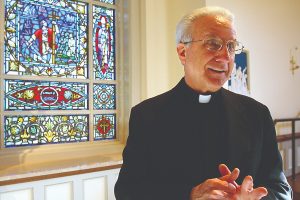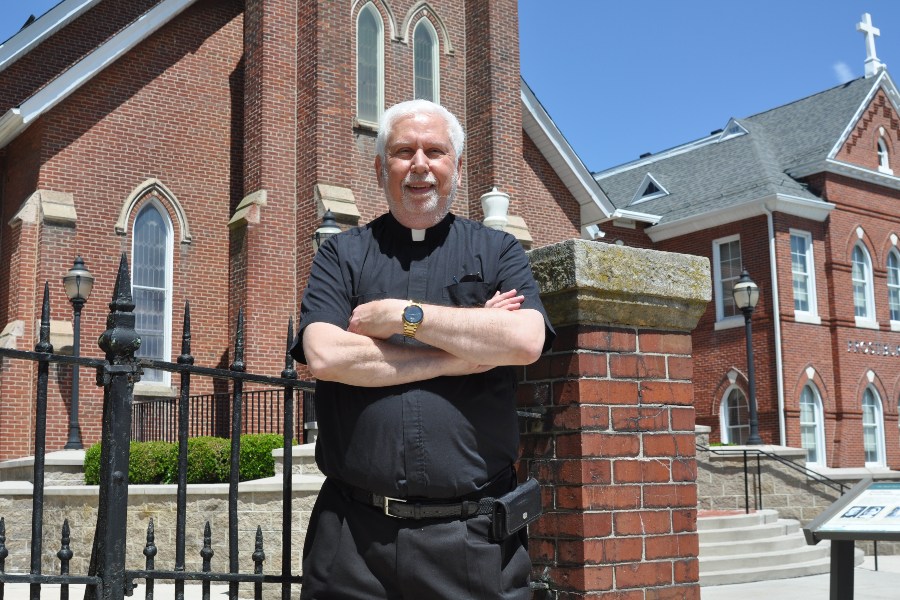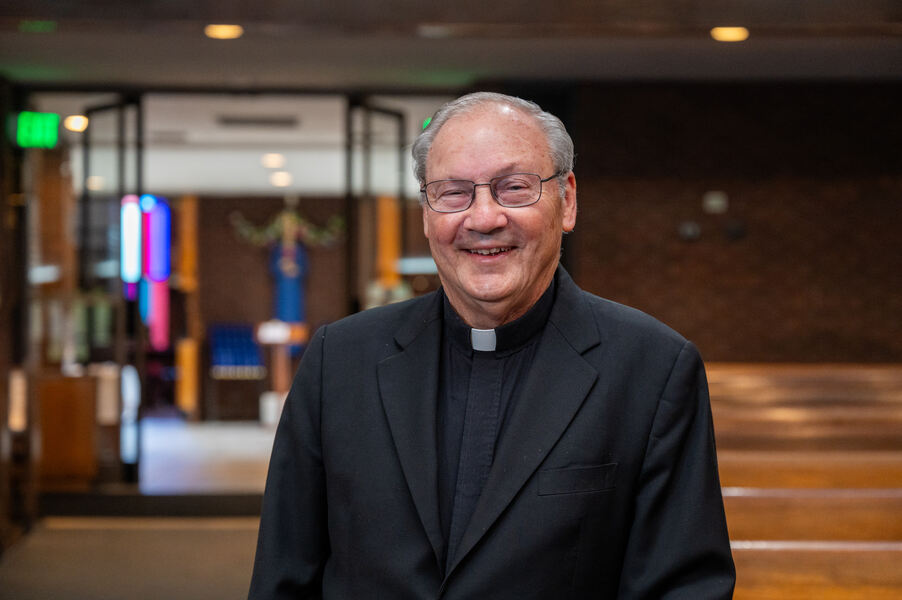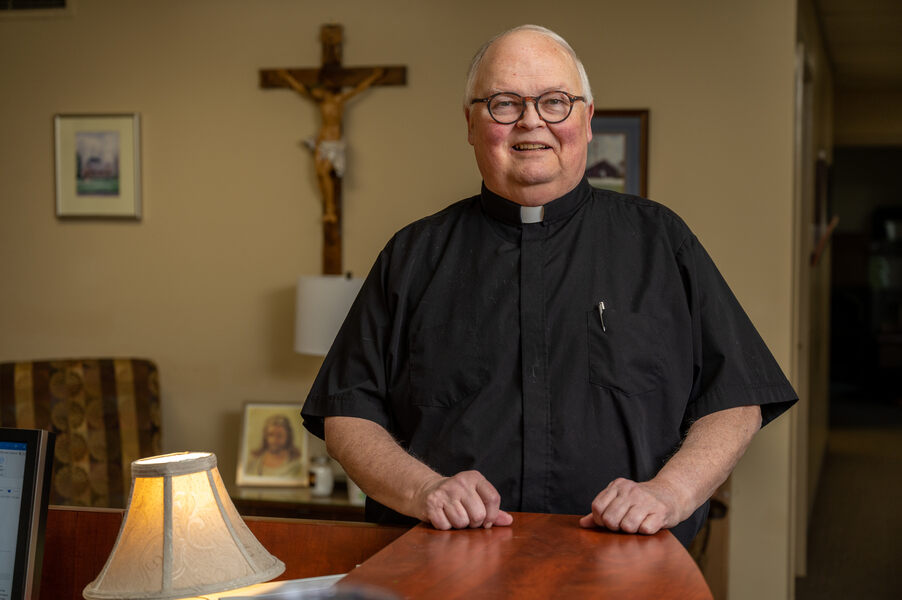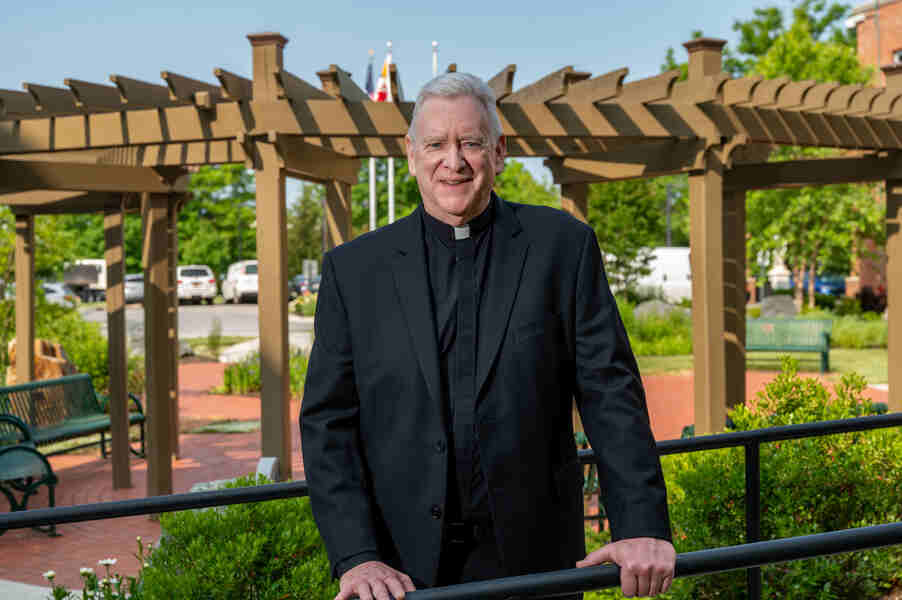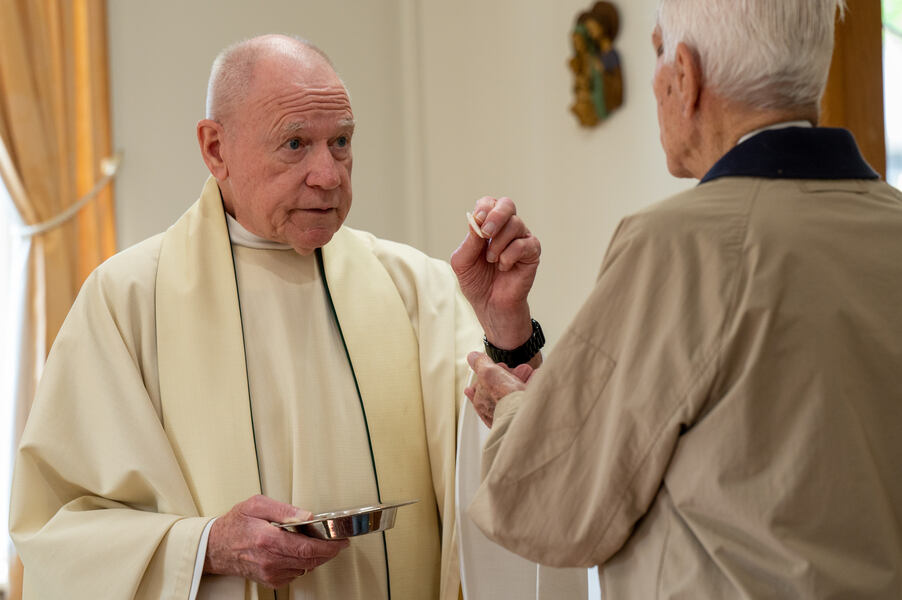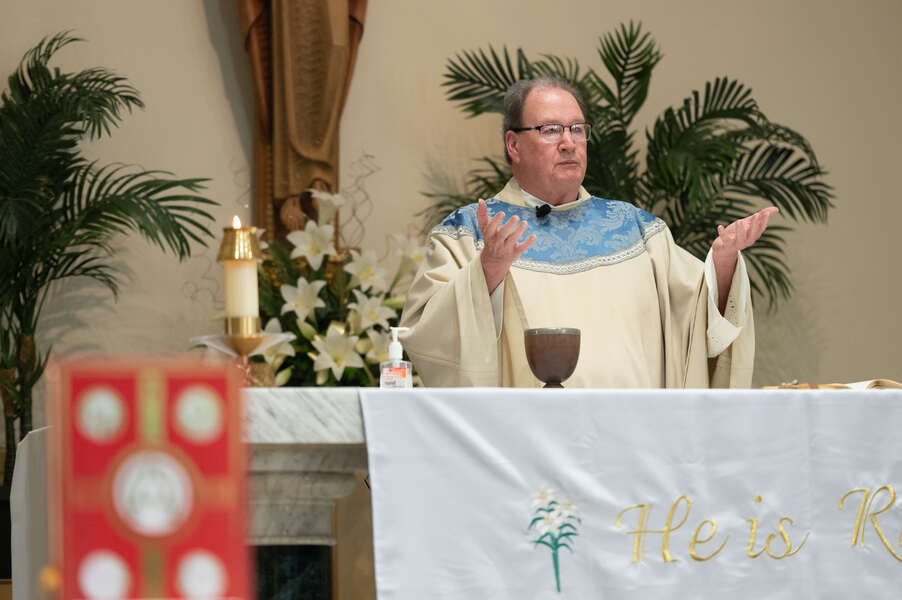Note: Six priests of the Archdiocese of Baltimore who have combined for nearly 300 years of ministry will be retiring July 1. The Review profiles the six as their parishes bid them farewell.
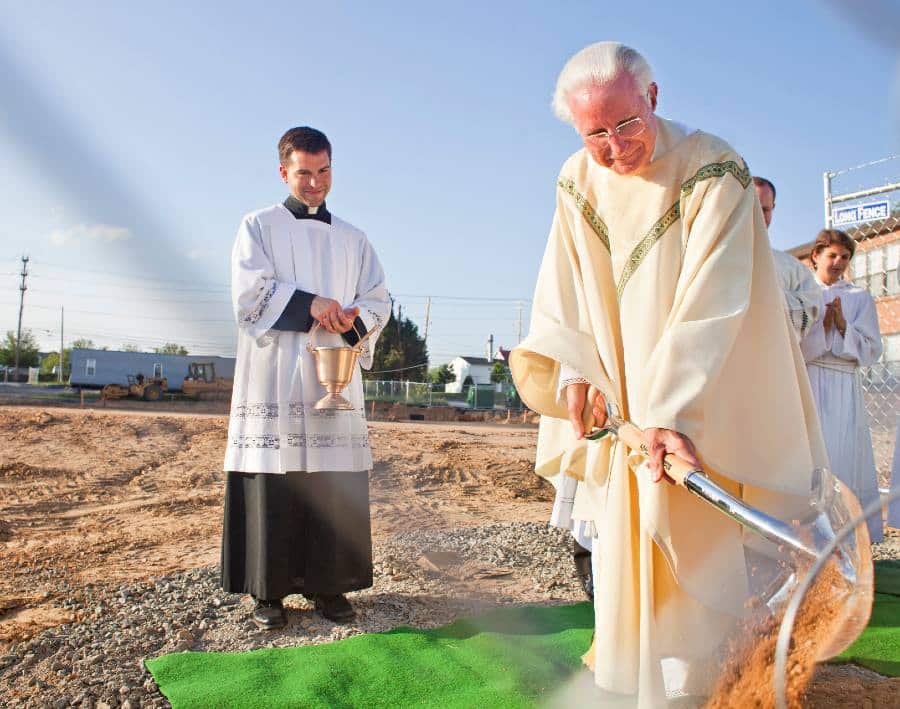
“Monumental” is an apt description of Monsignor Joseph L. Luca’s accomplishments at St. Louis Parish in Clarksville.
When he arrived at the fast-growing Howard County parish in 1996, the new pastor inherited a landlocked campus with a severe space crunch. The then-2,700 family faith community had already outgrown a new church that had been built only 16 years earlier. Seven staff members shared a single room for lack of office space, and scheduling multiple events a week was an increasingly impossible task.
While successfully pursuing the purchase of nearby parcels of land for expansion, Monsignor Luca worked with parish leaders on an ambitious masterplan. Parishioners embraced their new leader’s vision, donating millions to support a string of construction projects that began sprouting like mushrooms.
One of the largest churches in the Archdiocese of Baltimore was completed in 2006, built around nine 14-foot-tall stained-glass windows that were originally commissioned for the Basilica of the National Shrine of the Assumption of the Blessed Virgin Mary in downtown Baltimore.
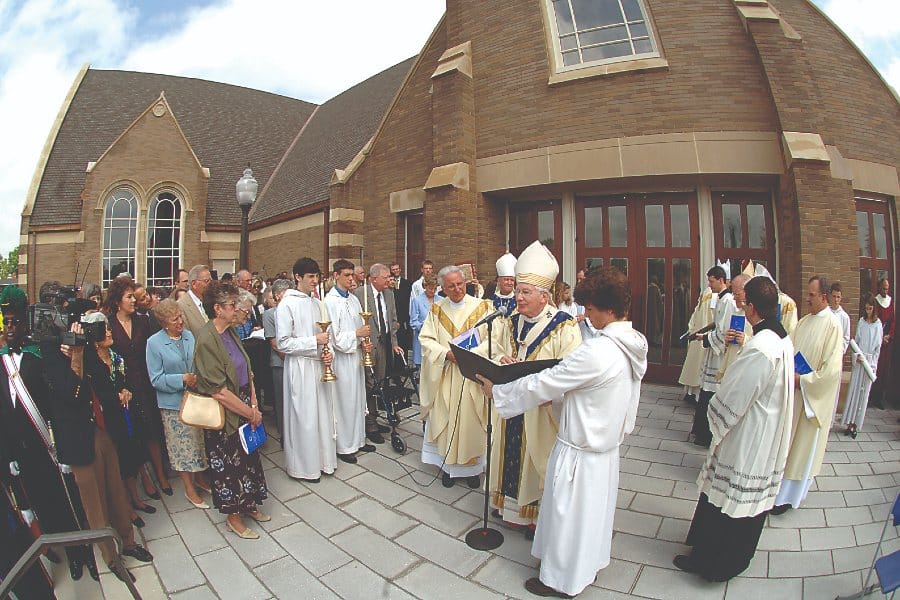
Seating 1,200, the “new” church includes an interior partly inspired by the 16th-century Venetian church, San Giorgio Maggiore. At the dedication of St. Louis’ new house of worship, Cardinal William H. Keeler described the structure as the archdiocese’s “cathedral of the south.”
Other projects included converting St. Louis’ 1980 church into a parish center, restoring an old chapel and erecting a 23,000-square-foot activities center adjoining the parish school building that includes a gymnasium with a theater stage. The parish now boasts a registry of more than 4,000 households.
As he prepares for his July 1 retirement and continues a two-decade, on-again-off-again battle with cancer, Monsignor Luca said all the physical improvements at St. Louis were the result of the “tremendous support and cooperation” of his parishioners. Although he described shepherding those projects to completion as “a real joy,” the mild-mannered priest said they aren’t what he considers the most important part of his priesthood.
“Yeah, we’ve had the opportunity to create a large campus with many wonderful new buildings,” said Monsignor Luca, who since 2018 has also led the 800-family parish of St. Francis of Assisi in Fulton as part of a single pastorate.
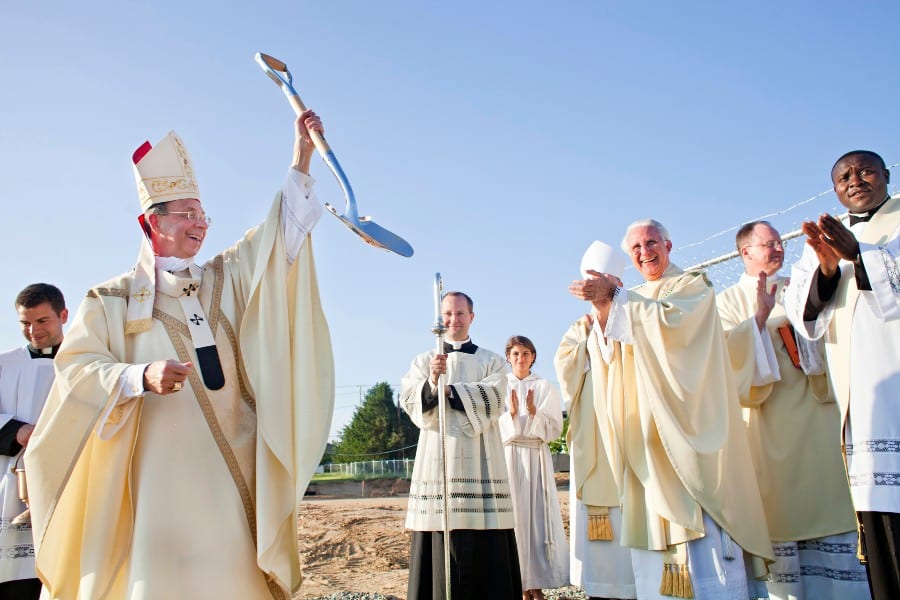
“But when it’s all said and done,” he said, “I don’t think people are going to care who did it. I think they’re going to care about who ministered to them in their time of spiritual need.”
Monsignor Luca, who has served as a mentor to future priests for decades, said he drives home that point to all new seminarians assigned to his pastorate by quizzing them about who built St. Louis’ cemetery chapel in 1855 or a parish chapel in 1889. No one is ever able to answer his questions, he said.
“My point is that when we’re called to the kingdom, no one’s going to remember who built those buildings,” he said. “But they will remember when their priest was there when they were in need of counseling. They’ll remember who celebrated their wedding, who celebrated with great joy the baptism of their first child, or who came to visit them in the hospital.”
Servant-leader
Kathy Sipes, a former administrator of Our Lady of Mount Carmel School in Essex, knows firsthand how Monsignor Luca’s pastoral vision touches lives. As pastor of the eastern Baltimore County parish in the 1980s and early 1990s, Monsignor Luca hired Sipes to lead the parish’s elementary school as principal. She later headed the high school before becoming president of both.
Sipes described Monsignor Luca as the “epitome of the servant-leader.”
“He could relate to folks who were in any economic group, any ethnicity, any education level – always focusing on what their needs were,” Sipes remembered.
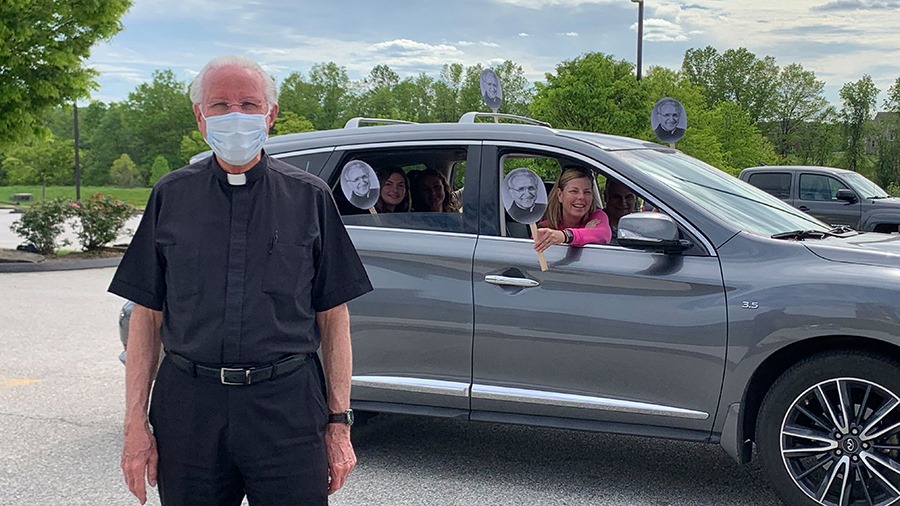
Monsignor Luca, 77, supported establishing an extended-care program at Mount Carmel long before many other Catholic schools embraced them, said Sipes, who now works in education at Notre Dame of Maryland University in Baltimore.
“He saw that need,” she said, “and he embraced a way of meeting that need and better serving working parents.”
After the priest left Mount Carmel to serve as Cardinal Keeler’s director of an archdiocesan-wide parish faith-enrichment program called “Renew,” he provided ongoing spiritual support to Sipes’ family as her husband battled a terminal illness.
“My husband passed away in the middle of the night in 1996,” Sipes remembered, “and that was my first phone call. Monsignor Luca did the funeral, which was the best liturgical experience of my entire life. Out of a really excruciating experience, he helped everybody see the good and the light in it – and that’s how he is with everyone.”
Unexpected path
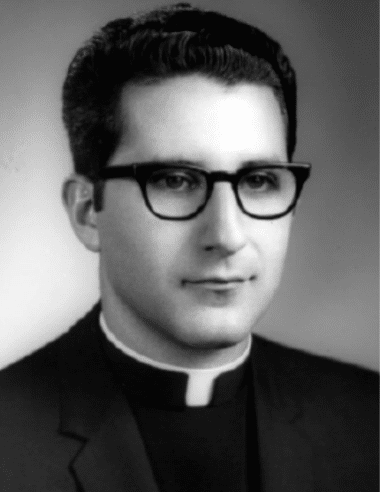
Growing up at St. Anthony of Padua, Gardenville, in Baltimore, Monsignor Luca was impressed by a young priest assigned to the parish, Monsignor Charles Meisel. Inspired by the clergyman, Monsignor Luca thought of becoming a priest, too, but dismissed it as “too sublime.”
After completing high school at Baltimore City College, Monsignor Luca enrolled in the pre-dentistry program at University of Maryland, College Park. One day, the Catholic chaplain there, Father William C. Tepe, invited Monsignor Luca to participate in a food and clothing drive at St. Elizabeth’s Hospital in Washington, D.C., a healthcare facility for people with mental disabilities.
“One thing led to the next and the more I got involved, the more I was impressed with what was being done and the more I was attracted to the priesthood,” Monsignor Luca said. “Father Tepe said I should try the seminary.”
Monsignor Luca studied at Resurrection College in Canada and Mount St. Mary’s Seminary in Emmitsburg. He was ordained to the priesthood in 1970 at the Cathedral of Mary Our Queen in Homeland.
Monsignor Luca’s early assignments were as associate pastor of St. Francis of Assisi, Baltimore; St. Clement Mary Hofbauer, Rosedale, and St. Joseph, Cockeysville. He also served as chairman of the Citizens Advisory Board for Montebello Hospital Center in Baltimore in the 1970s, appointed to the post by Gov. Marvin Mandel. There, he was credited with helping improve conditions for patients, according to a 1982 article in the Catholic Review.
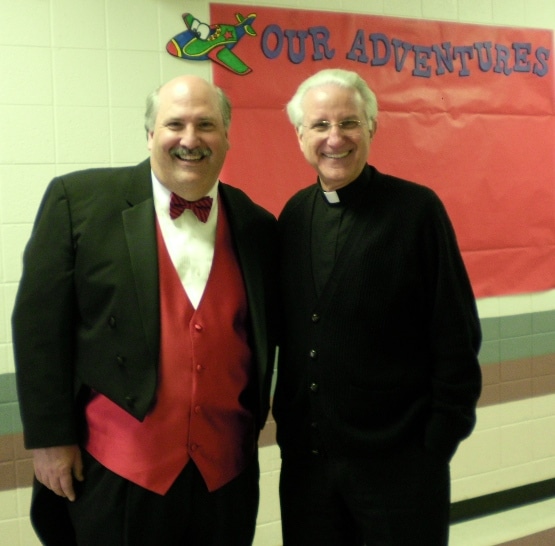
Monsignor Luca was pastor of Mount Carmel from 1982 to 1993 and director of Renew from 1993 to 1996.
Pat Sprankle, director of youth ministry at St. Louis, has known Monsignor Luca throughout the priest’s quarter century at the parish. Sprankle remembered that when the pastor first arrived, he asked what Sprankle needed to do his job.
“I jokingly said a bus,” Sprankle recalled with a laugh. “Guess what we got? A 15-passenger van. Anything I would have asked for, he would have supported.”
Sprankle said Monsignor Luca has “super-human” strength and the management skills of a CEO who could run any large company in the business world. The priest cares deeply about his people, Sprankle said, and he doesn’t get in the way of lay ministry.
“He knows that he’s too busy to do everything,” Sprankle said.
Monsignor Luca’s spirit of lay empowerment was evident in his support for the parish school, where he trusted lay leaders and teachers to provide strong academics and cultivate Catholic values. St. Louis was named a national Blue Ribbon School by the U.S. Department of Education in 2010, a much-coveted designation boosted by an application that included a submission from the pastor.
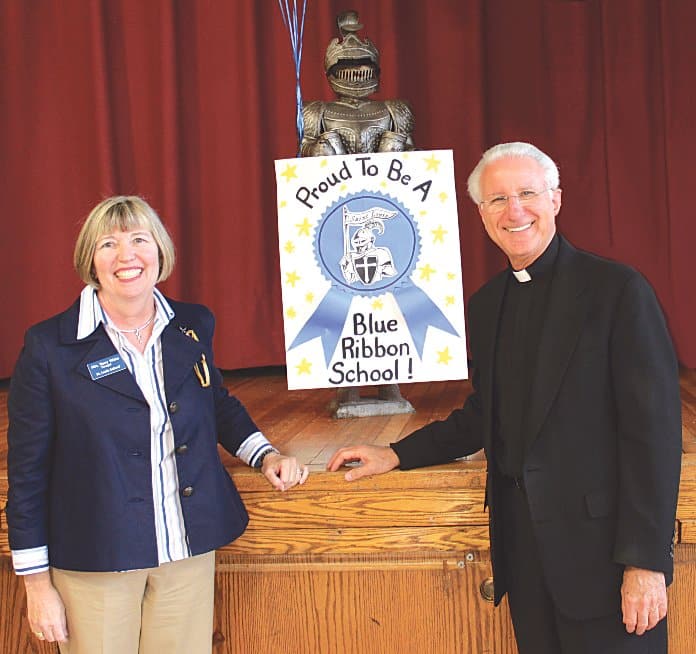
The youth minister said that over the course of his long battle with cancer, Monsignor Luca has shown “incredible courage.” He has undergone brain surgery and other treatments for the disease.
Monsignor Luca said his illness has shown him how to be a better priest.
“I’ve not talked about it much, but it’s made me more aware of the people who go through it and it’s helped me to appreciate more what they’re going through,” he said. “When you experience it yourself, you come to appreciate what others are experiencing.”
Throughout his priesthood, Monsignor Luca said his own faith has been strengthened by the example of the people he has served. He recalled that when he was an associate pastor of St. Joseph in Cockeysville, he received an early-morning call from an elderly man asking him to come to his apartment after he discovered his wife had died. Three weeks earlier, Monsignor Luca had celebrated the couple’s 70th wedding anniversary.
“After I said the prayers of the church, this old man who could barely stand up said something I will never forget,” Monsignor Luca said. “With tears in his eyes, he simply said, ‘Oh, my God, how I loved her.’ It was one of those occasions that really taught you that the faith was alive and well.”
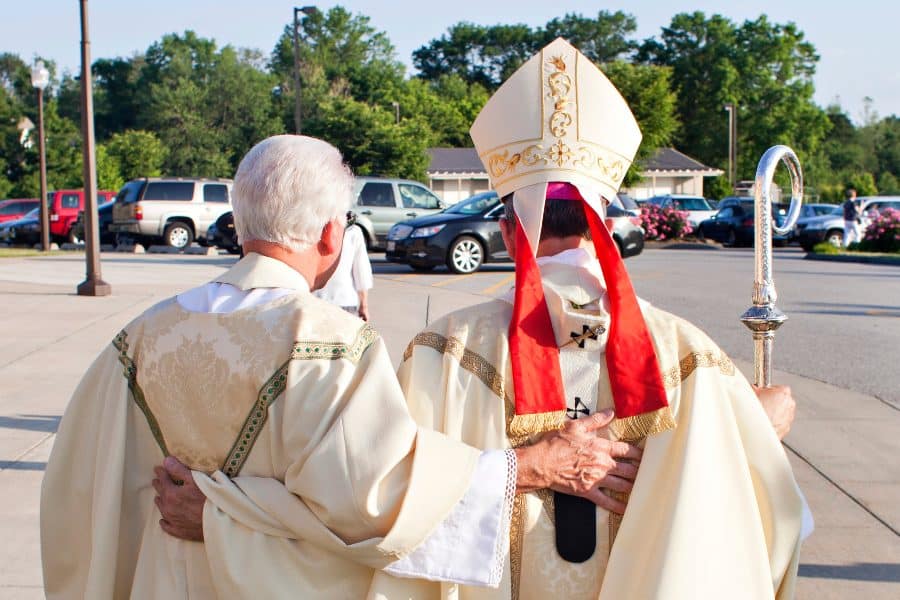
Just as he was inspired to the religious life by the example of other priests, Monsignor Luca has been an example to others. In the last 25 years, St. Louis has produced numerous priests, deacons and women religious – one of the leading parishes in the archdiocese for cultivating religious vocations. Monsignor Luca has personally invited many young people to consider the religious life and has consciously tried to provide an example of joyful priesthood.
The white-haired priest, who will remain in the Archdiocese of Baltimore in his retirement, said it is important not to lose sight of a great number of people who “very much value and love their faith and have a positive influence on priests.”
“I’m just very grateful to God that I was able to spend my life in service as a priest,” Monsignor Luca said.
St. Louis will hold a farewell Mass for Monsignor Luca June 6, at noon, celebrated by Archbishop William E. Lori. It will be livestreamed on the parish’s YouTube page. At 5 p.m., a ticketed concert in the pastor’s honor will be presented in collaboration with the Columbia Orchestra and the music ministries of St. Francis and St. Louis.
Email George Matysek at gmatysek@CatholicReview.org
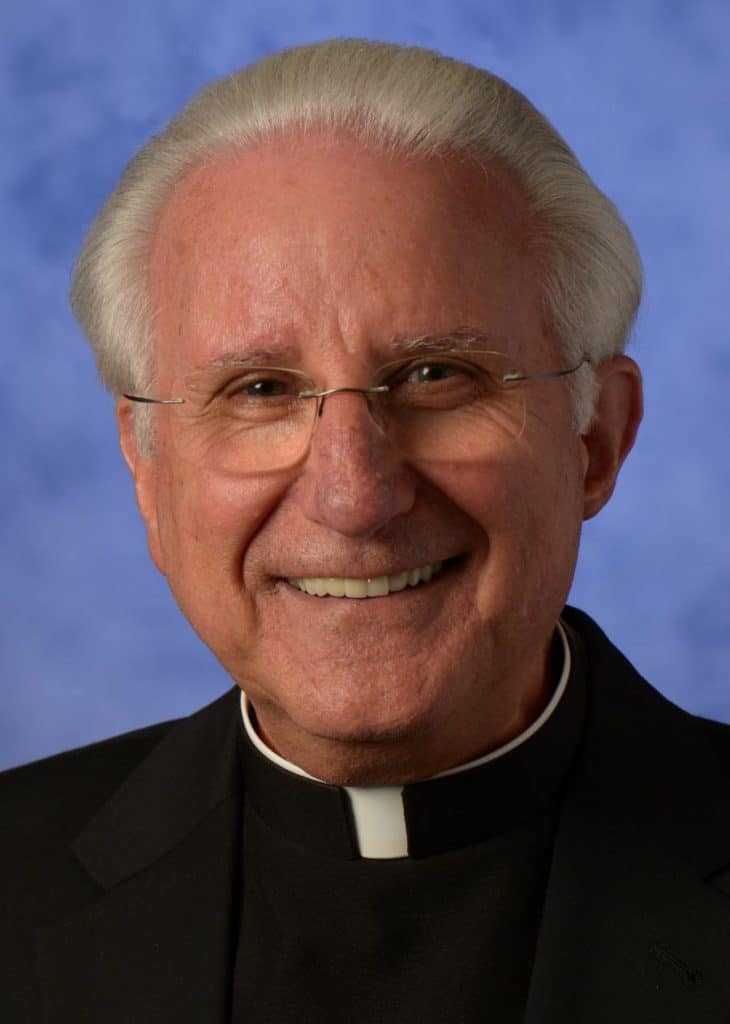
Monsignor Joseph L. Luca
Born: Aug. 16, 1943
Home parish: St. Anthony of Padua, Baltimore
Education: St. Anthony School; Baltimore City College; University of Maryland, College Park; Resurrection College, Canada; Mount St. Mary’s Seminary, Emmitsburg
Ordained: May 16, 1970, at Cathedral of Mary Our Queen in Homeland
Assignments: St. Francis of Assisi, Baltimore, associate pastor, 1970-75; St. Clement Mary Hofbauer, Rosedale, associate pastor, 1975-76; St. Joseph Cockeysville, associate pastor, 1976-1981; Our Lady of Mount Carmel, Essex, pastor, 1982-1993; Director of Renew, Archdiocese of Baltimore, 1993-96; St. Louis, Clarksville, pastor, 1996-2018; St. Louis, Clarksville and St. Francis of Assisi, Fulton, pastorate, pastor 2018-2021
Examples of faith: “The faith of the people has been so inspiring, especially in difficult times when I’ve had the honor of meeting with people and sharing with them some ideas of faith and how they’ve acted on those thoughts. I think I’ve gotten more from them than I’ve given to them.”
Also see
Copyright © 2021 Catholic Review Media
